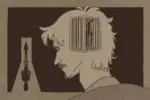It can be hard to find the time to pick up a book, especially between classes and exams. If you’re an avid reader, this can be frustrating, so here’s a list of short stories to check out when you’re short on time and looking for a good read.
“Drinking Coffee Elsewhere” by ZZ Packer was published in “The New Yorker” in 2000. Three years later, the writer included it in her debut short story collection of the same name. The story follows Dina, a Black freshman at Yale University. Dina is a live wire — she’s been through a lot, and she hides her vulnerability with biting cruelty. When she makes a homicidal joke (or threat?) during orientation, she lands in hot water with the administration. Dina trades in her high school good-girl reputation for a semester of isolation, ruptured only by mandatory counseling sessions and a reluctant friendship with Heidi, a fellow classmate. As the two grow closer, Dina slowly comes out of her shell as she undergoes the grim self-discovery of young adulthood. Though Dina also reckons with race, queer sexuality and loss, her biggest struggle is against herself.
“Mother and Child” by Laura Freudig was published in “The Sun” in 2018. On a blustery island off the coast of Maine, a nameless mother spends her days tending to her infant son, Clint, and fielding calls from her helicopter husband, John. Every day alone with the baby is a battle against loneliness and intrusive thoughts. She has no friends or family in the small town, and John’s effortless connection with Clint makes her feel like an outsider in her own home. Motherhood is chipping away at her already tenuous individuality. Gloomy imagery looms throughout the first-person narrative, grounding the woman’s story in brooding naturalism. With an Atlantic storm on the horizon, she makes a desperate effort to reclaim her identity. Freudig crafts an arresting tale about familial responsibility, suffocating social norms, mental stress and finding grace where you least expect it.
“How I Met My Husband” was first published in “Something I’ve Been Meaning to Tell You,” a 1974 collection of short stories by Alice Munro. In the 1950s Canadian countryside, a teenage girl named Edie works as a housemaid for Dr. and Mrs. Peebles. Their middle-class pleasures enchant Edie, who comes from a simple family of farmers. However, she can’t let her guard down. Her employers are nice, but Edie is painfully aware that she’s not part of the family, and the arrival of a dashing pilot upending Edie’s domestic life threatens her job, her reputation and her happiness. Munro artfully captures the intimate violence of class hierarchy and internalized misogyny. These sobering realities hit hard, but a delightful twist ending makes this a charmingly poignant read.
“Gold Boy, Emerald Girl” by Yiyun Li first appeared in a 2008 issue of “The New Yorker.” In 2010, Li included it in her short story collection of the same name. The story follows three characters in Beijing: Professor Dai, an aging, retired zoologist, her middle-aged son, Hanfeng and her former student, Siyu, who is now a librarian. While Hanfeng was working in the United States, Siyu kept his mother company. Now that he’s back in China, Dai arranges a marriage between her son and her student. Though it seems controlling, the proposed relationship challenges cultural stigmas around queerness and singleness. Li’s poetic minimalism conveys stark vignettes of loneliness and loss. The highlight of this story is the complex relationship among the characters, whose inner longings are felt, but never voiced.
“You Can Leave, But It’s Going to Cost You” is the last story in Camille Acker’s collection “Training School for Negro Girls,” which was published in 2018. In this piece, a man drives the winding streets of Washington, D. C. while his daughter, Theresa, relaxes in the passenger seat. Now that the young woman is an adult, she and her father can open up to each other about their lives as Marvin Gaye provides a soundtrack for the twilight outing. The older man praises the singer’s artistic genius, made possible because he was from their city. This sense of hope invigorates the story. Theresa and her father come from the greatest city in the world, which makes them strong enough to face the music when they’ve hurt the people they love. Acker’s characters are flawed yet honest, and they resonate because of this authenticity.
“Across the Wide Missouri” by John Edgar Wideman was published in his 1981 collection “Damballah.” Wideman’s semi-autobiographical short stories are known for their striking realism and stream-of-consciousness narration. This one follows a Black author reminiscing about his childhood in 1950s Pittsburgh. One afternoon at his mother’s insistence, he visited his estranged father at work. His father was a waiter in an upscale restaurant with an all-white clientele and an all-Black staff. The conversation was stilted; the author can’t recall what they talked about, but he does remember the movie they saw that day. It was a Western, an ode to rugged masculinity. As the author considers his relationship with his own son, he reflects on that dark theater from thirty years ago. There, his father’s face, usually dulled by minimum wage drudgery, had reflected the Technicolor glory of Americana.
“Just Outside Our Windows, Deep Inside Our Walls” by Brian Hodge was originally published online in 2010. It later appeared in his 2019 collection “Skidding into Oblivion.” The subtle horror narrative centers on a young boy with a dark ability. To protect him and others, his parents banish him to the upper floor of the house. One spring day, a sullen older girl named Roni moves into the house next door. They begin trading secrets through their windows. Slowly, Roni becomes the boy’s only connection to the outside world. In the final whispers of summer, Roni’s own heartbreaking past catches up to her. The kids team up to help her escape, and the boy finally gets a chance to use his eerie powers for good. Unsettling magical realism bolsters a universal tale about childhood, companionship and the comforting sound of silence.
Short stories are a great way to try new genres and authors. These seven gripping tales offer brief entertainment without sacrificing complexity or heart.

















